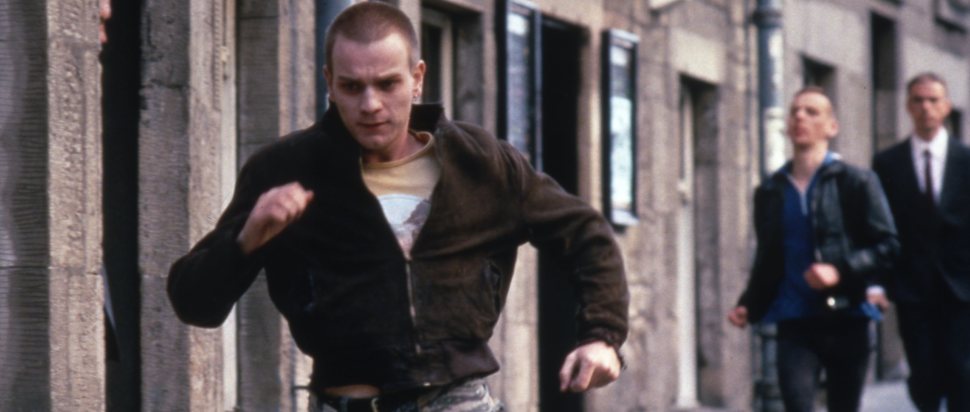How Trainspotting Changed Scotland, 25 Years On
How Danny Boyle's swaggering and hilarious film about a group of young heroin addicts in Edinburgh seared itself on a generation's consciousness and helped change Scotland forever
Want to feel old? On 23 February, it’ll be 25 years since the release of Trainspotting.
Danny Boyle’s masterwork was arguably the most influential British film of the 90s. Its frenetic pace, blending of tragedy and comedy, stylised set pieces and pulsating soundtrack set it apart from the po-faced realist dramas of underclass minutiae that characterised the decade.
The film captures the alternating absurdity and banality of the day-to-day lives of several Edinburgh addicts. When Trainspotting splattered into cinemas, anyone who saw it – perhaps shown by their parents to warn them of the perils of drug abuse and inner toilet exploration – has the image of Ewan McGregor and Ewen Bremner bolting down Princes Street to Iggy Pop’s Lust for Life burned into their consciousness. The scene, and the film, contain iconography that lives long in the mind. McGregor's Renton sinks into the carpet; he laughs at us, the puzzled motorist trying to navigate the spaghetti junctions of the film. He sees a baby on the ceiling and reacts as we all would. British film has since tried to replicate Trainspotting's vim, vigour, and blend of crushing realism and stylisation – none have bettered it.
Set in the barren badlands outwith the cushy haunts of Edinburgh, but filmed almost exclusively in Glasgow, Trainspotting paints a lasting picture of Scotland. The high-rises, the affluent Princes Street an oxymoron amid the drab pubs, clubs and decaying streets and crumbling flats. Scottish life in the 90s looks like a far worse vocation than any vice, be it heroin, booze, or a spot of ultraviolence.
It is not, however, the mise-en-scène that underpins the Scottishness of the film. Its imagery, a world away from pipers and haggis and the grandeur of affluent Edinburgh, only tells part of the story. The script’s inflections of humour and pathos amid a dreary set of circumstances, the tone of helplessness through which, like a ray of sunlight through an overcast Scottish morning, ends on a note of hope and prospects, are the rhythm of the film’s Scottish heart. The film came out three years before devolution and the Scottish Parliament, wherein the UK's oft-forgotten problem child, with its unhealthy lifestyle choices and antisocial behaviour, began to get its shit together.
25 years on, Scotland has had a makeover; the 21st century has seen the nation go from strength to strength as a European player. Choose an international hotspot for tourism. Choose a whisky industry that is at the apex of the global food and drink chain. Choose a classy option for travellers and revellers. Every good actor that you like watching in everything? Scots, the lot of them.
Alas, as Renton so eloquently puts it, Scotland is still “colonised by wankers!” But perhaps not for much longer. Trainspotting marks a turning point in Scottish fortune. The journey of the film feels like a collective, national kicking of a few bad habits.
The film endures among my generation. When I came to Edinburgh for university, it was at the forefront of my mind. Every time I'm on Princes Street – even with the trams and volley of fragrances pouring out of Lush, people taking a picture of the castle, and then a picture of themselves and the castle – I still feel a jolt; I still feel like sprinting. Edinburgh locations were used far more in T2, the sequel which, I think it is fair to say, has been overlooked somewhat. I am not sorry to say that I recognised a lot of its nightlife spots, after many nights out on those particular sick-stained tiles.
Trainspotting is true to its word in showing us the lowest of the low. It has many horrible people doing many horrible things and ending in horrible situations. It is also one of the funniest films ever made. When Spud (Bremner) flung his dung-filled bed sheets over the breakfast table, the girl he spent the night with and her unassuming parents, my whole being contorted with laughter. When the gang stand over the cot, and Sick Boy (Jonny Lee Miller) breaks down, I wanted the carpet to swallow me up like it does Renton. The artful variations of tragedy and comedy, the symphonic rise and fall of horror and humour, endears Trainspotting to the hearts and minds of filmgoers. That same splatter within the messy, ludicrous, terrible, and ultimately hopeful two hours of film, secures it as a modern Scottish masterpiece.
Trainspotting screens on Film4, 23 Feb, 10.50pm and is available to stream on All4 thereafter https://www.channel4.com/programmes/trainspotting
